Mental Health Case Study: Chung - Western Sydney Uni - 401013
VerifiedAdded on 2023/06/07
|11
|2519
|417
Case Study
AI Summary
This case study examines Chung's mental health status, including mood, affect, thought processes, and potential DSM-V diagnoses such as anxiety and eating disorders. It explores factors contributing to his condition, such as workplace stress, lack of family time, and cultural isolation, using the stress-vulnerability model. The study further discusses aspects of mental health recovery, emphasizing respect, hope, and empowerment in the recovery process. It references various academic sources to support its analysis and recommendations. Desklib provides a platform for students to access similar solved assignments and study resources.
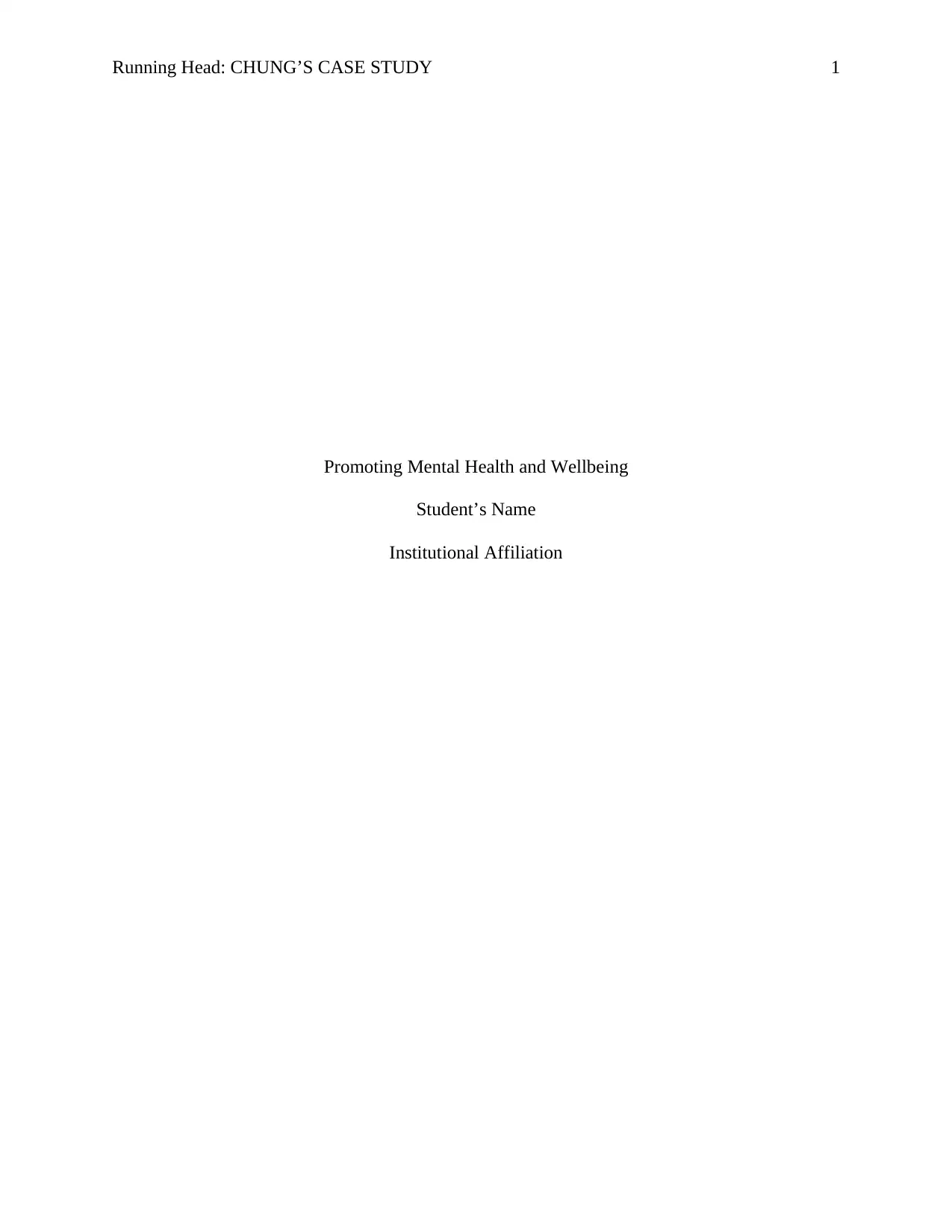
Running Head: CHUNG’S CASE STUDY 1
Promoting Mental Health and Wellbeing
Student’s Name
Institutional Affiliation
Promoting Mental Health and Wellbeing
Student’s Name
Institutional Affiliation
Paraphrase This Document
Need a fresh take? Get an instant paraphrase of this document with our AI Paraphraser
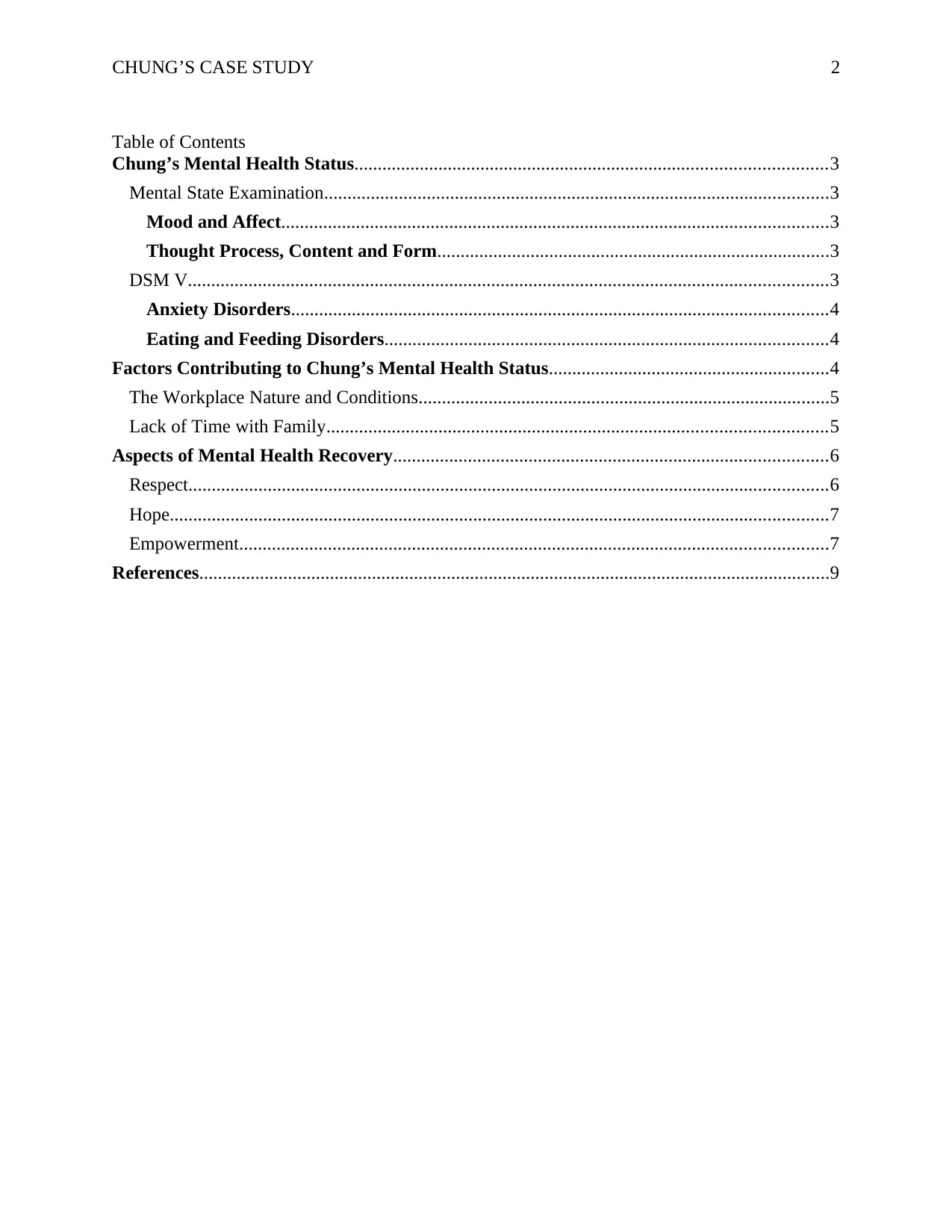
CHUNG’S CASE STUDY 2
Table of Contents
Chung’s Mental Health Status.....................................................................................................3
Mental State Examination............................................................................................................3
Mood and Affect.....................................................................................................................3
Thought Process, Content and Form....................................................................................3
DSM V.........................................................................................................................................3
Anxiety Disorders...................................................................................................................4
Eating and Feeding Disorders...............................................................................................4
Factors Contributing to Chung’s Mental Health Status............................................................4
The Workplace Nature and Conditions........................................................................................5
Lack of Time with Family...........................................................................................................5
Aspects of Mental Health Recovery.............................................................................................6
Respect.........................................................................................................................................6
Hope.............................................................................................................................................7
Empowerment..............................................................................................................................7
References.......................................................................................................................................9
Table of Contents
Chung’s Mental Health Status.....................................................................................................3
Mental State Examination............................................................................................................3
Mood and Affect.....................................................................................................................3
Thought Process, Content and Form....................................................................................3
DSM V.........................................................................................................................................3
Anxiety Disorders...................................................................................................................4
Eating and Feeding Disorders...............................................................................................4
Factors Contributing to Chung’s Mental Health Status............................................................4
The Workplace Nature and Conditions........................................................................................5
Lack of Time with Family...........................................................................................................5
Aspects of Mental Health Recovery.............................................................................................6
Respect.........................................................................................................................................6
Hope.............................................................................................................................................7
Empowerment..............................................................................................................................7
References.......................................................................................................................................9
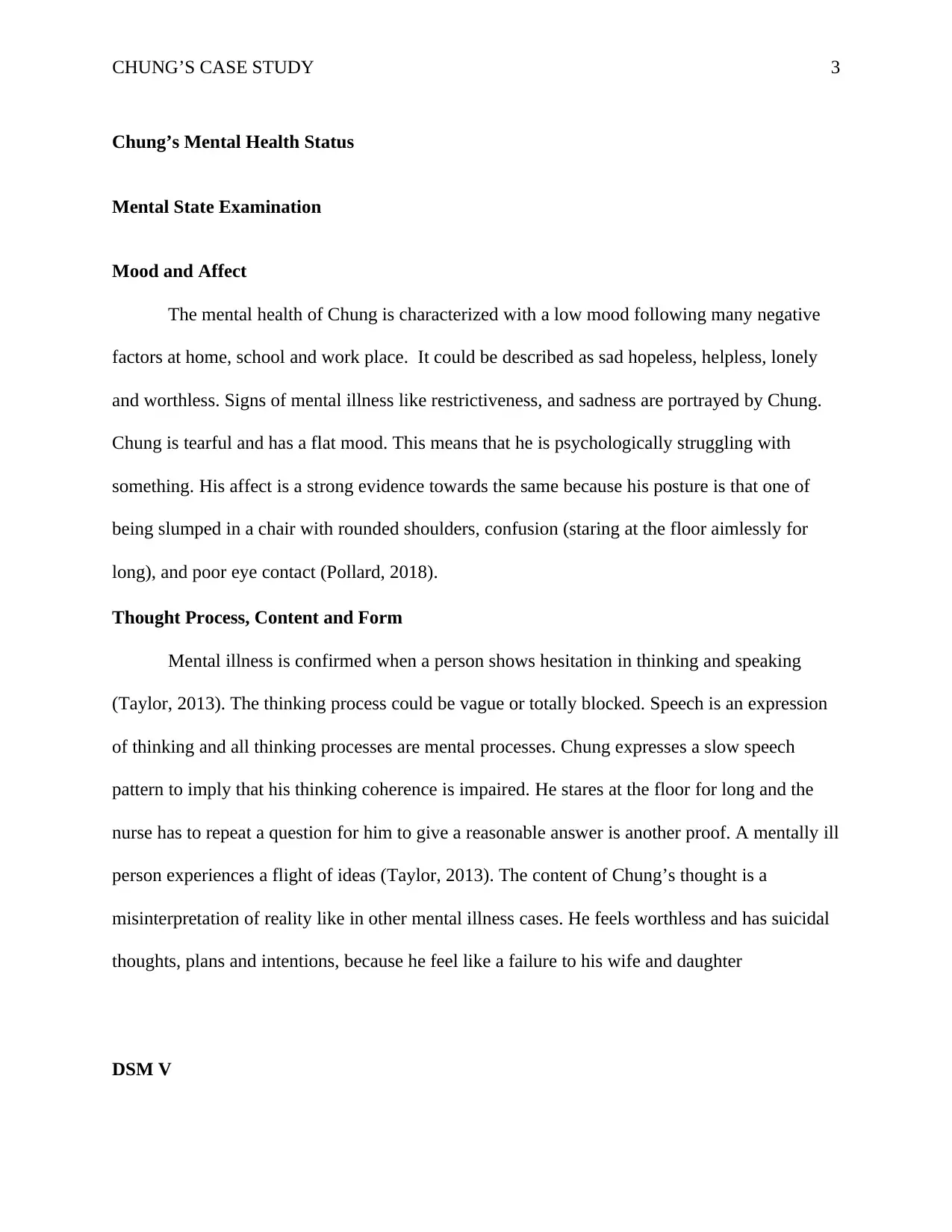
CHUNG’S CASE STUDY 3
Chung’s Mental Health Status
Mental State Examination
Mood and Affect
The mental health of Chung is characterized with a low mood following many negative
factors at home, school and work place. It could be described as sad hopeless, helpless, lonely
and worthless. Signs of mental illness like restrictiveness, and sadness are portrayed by Chung.
Chung is tearful and has a flat mood. This means that he is psychologically struggling with
something. His affect is a strong evidence towards the same because his posture is that one of
being slumped in a chair with rounded shoulders, confusion (staring at the floor aimlessly for
long), and poor eye contact (Pollard, 2018).
Thought Process, Content and Form
Mental illness is confirmed when a person shows hesitation in thinking and speaking
(Taylor, 2013). The thinking process could be vague or totally blocked. Speech is an expression
of thinking and all thinking processes are mental processes. Chung expresses a slow speech
pattern to imply that his thinking coherence is impaired. He stares at the floor for long and the
nurse has to repeat a question for him to give a reasonable answer is another proof. A mentally ill
person experiences a flight of ideas (Taylor, 2013). The content of Chung’s thought is a
misinterpretation of reality like in other mental illness cases. He feels worthless and has suicidal
thoughts, plans and intentions, because he feel like a failure to his wife and daughter
DSM V
Chung’s Mental Health Status
Mental State Examination
Mood and Affect
The mental health of Chung is characterized with a low mood following many negative
factors at home, school and work place. It could be described as sad hopeless, helpless, lonely
and worthless. Signs of mental illness like restrictiveness, and sadness are portrayed by Chung.
Chung is tearful and has a flat mood. This means that he is psychologically struggling with
something. His affect is a strong evidence towards the same because his posture is that one of
being slumped in a chair with rounded shoulders, confusion (staring at the floor aimlessly for
long), and poor eye contact (Pollard, 2018).
Thought Process, Content and Form
Mental illness is confirmed when a person shows hesitation in thinking and speaking
(Taylor, 2013). The thinking process could be vague or totally blocked. Speech is an expression
of thinking and all thinking processes are mental processes. Chung expresses a slow speech
pattern to imply that his thinking coherence is impaired. He stares at the floor for long and the
nurse has to repeat a question for him to give a reasonable answer is another proof. A mentally ill
person experiences a flight of ideas (Taylor, 2013). The content of Chung’s thought is a
misinterpretation of reality like in other mental illness cases. He feels worthless and has suicidal
thoughts, plans and intentions, because he feel like a failure to his wife and daughter
DSM V
⊘ This is a preview!⊘
Do you want full access?
Subscribe today to unlock all pages.

Trusted by 1+ million students worldwide
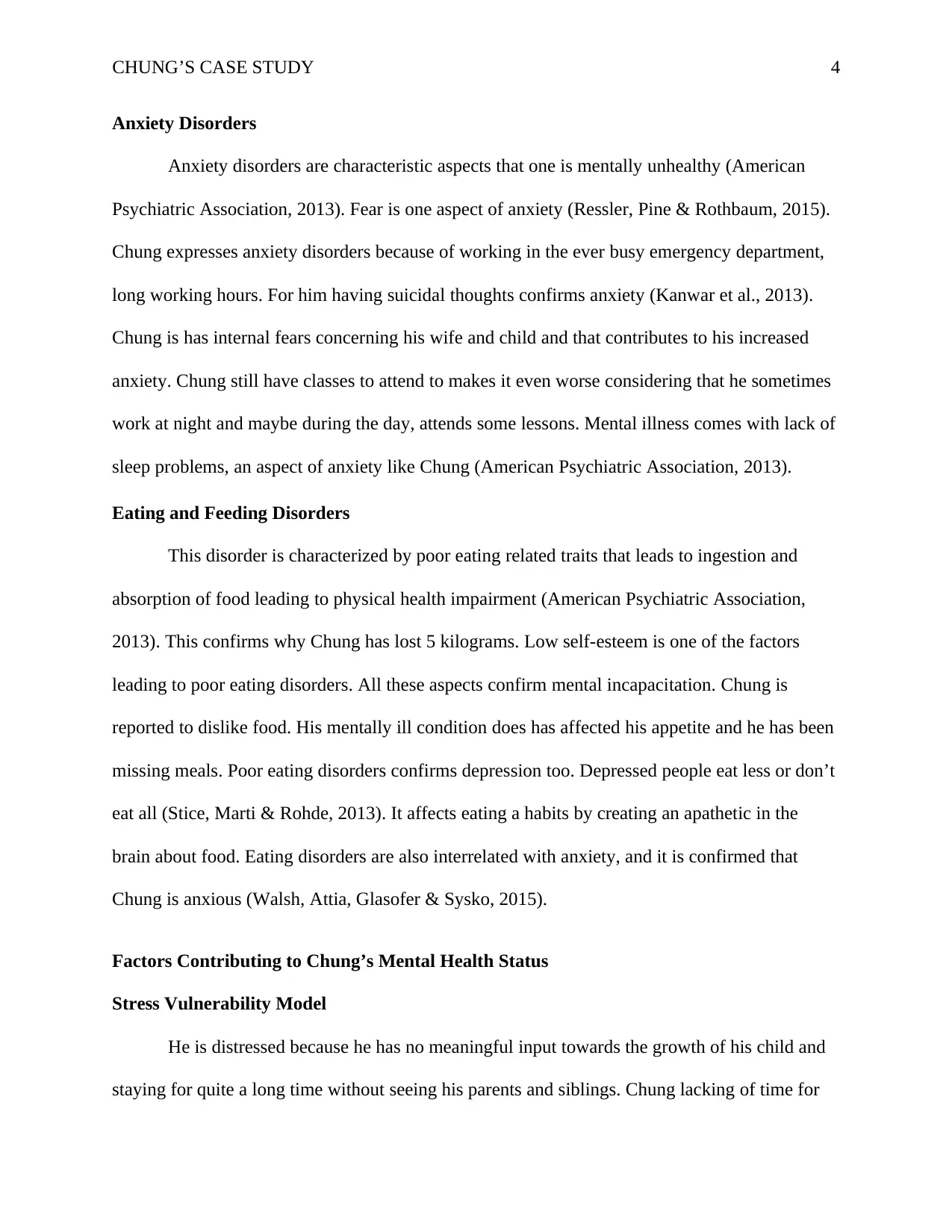
CHUNG’S CASE STUDY 4
Anxiety Disorders
Anxiety disorders are characteristic aspects that one is mentally unhealthy (American
Psychiatric Association, 2013). Fear is one aspect of anxiety (Ressler, Pine & Rothbaum, 2015).
Chung expresses anxiety disorders because of working in the ever busy emergency department,
long working hours. For him having suicidal thoughts confirms anxiety (Kanwar et al., 2013).
Chung is has internal fears concerning his wife and child and that contributes to his increased
anxiety. Chung still have classes to attend to makes it even worse considering that he sometimes
work at night and maybe during the day, attends some lessons. Mental illness comes with lack of
sleep problems, an aspect of anxiety like Chung (American Psychiatric Association, 2013).
Eating and Feeding Disorders
This disorder is characterized by poor eating related traits that leads to ingestion and
absorption of food leading to physical health impairment (American Psychiatric Association,
2013). This confirms why Chung has lost 5 kilograms. Low self-esteem is one of the factors
leading to poor eating disorders. All these aspects confirm mental incapacitation. Chung is
reported to dislike food. His mentally ill condition does has affected his appetite and he has been
missing meals. Poor eating disorders confirms depression too. Depressed people eat less or don’t
eat all (Stice, Marti & Rohde, 2013). It affects eating a habits by creating an apathetic in the
brain about food. Eating disorders are also interrelated with anxiety, and it is confirmed that
Chung is anxious (Walsh, Attia, Glasofer & Sysko, 2015).
Factors Contributing to Chung’s Mental Health Status
Stress Vulnerability Model
He is distressed because he has no meaningful input towards the growth of his child and
staying for quite a long time without seeing his parents and siblings. Chung lacking of time for
Anxiety Disorders
Anxiety disorders are characteristic aspects that one is mentally unhealthy (American
Psychiatric Association, 2013). Fear is one aspect of anxiety (Ressler, Pine & Rothbaum, 2015).
Chung expresses anxiety disorders because of working in the ever busy emergency department,
long working hours. For him having suicidal thoughts confirms anxiety (Kanwar et al., 2013).
Chung is has internal fears concerning his wife and child and that contributes to his increased
anxiety. Chung still have classes to attend to makes it even worse considering that he sometimes
work at night and maybe during the day, attends some lessons. Mental illness comes with lack of
sleep problems, an aspect of anxiety like Chung (American Psychiatric Association, 2013).
Eating and Feeding Disorders
This disorder is characterized by poor eating related traits that leads to ingestion and
absorption of food leading to physical health impairment (American Psychiatric Association,
2013). This confirms why Chung has lost 5 kilograms. Low self-esteem is one of the factors
leading to poor eating disorders. All these aspects confirm mental incapacitation. Chung is
reported to dislike food. His mentally ill condition does has affected his appetite and he has been
missing meals. Poor eating disorders confirms depression too. Depressed people eat less or don’t
eat all (Stice, Marti & Rohde, 2013). It affects eating a habits by creating an apathetic in the
brain about food. Eating disorders are also interrelated with anxiety, and it is confirmed that
Chung is anxious (Walsh, Attia, Glasofer & Sysko, 2015).
Factors Contributing to Chung’s Mental Health Status
Stress Vulnerability Model
He is distressed because he has no meaningful input towards the growth of his child and
staying for quite a long time without seeing his parents and siblings. Chung lacking of time for
Paraphrase This Document
Need a fresh take? Get an instant paraphrase of this document with our AI Paraphraser
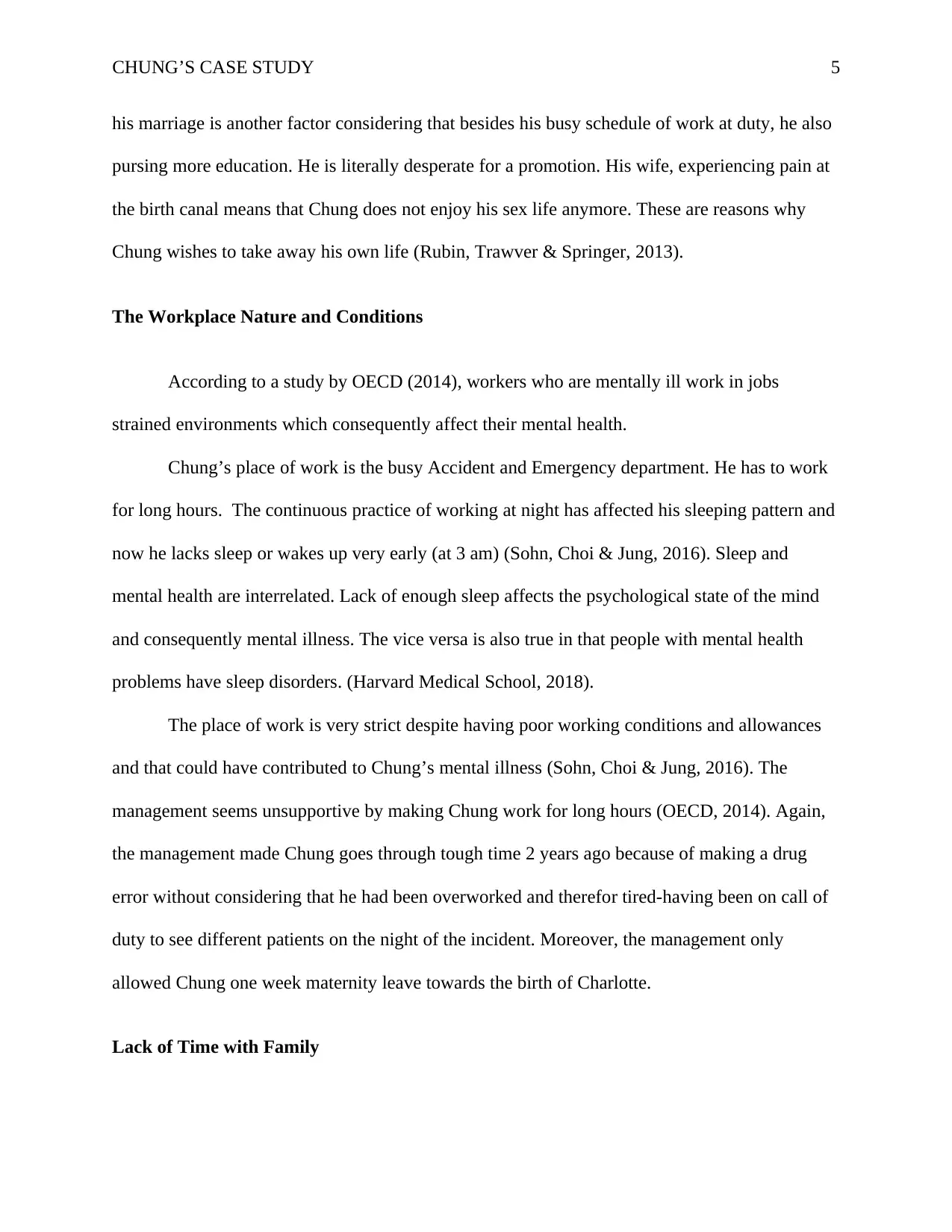
CHUNG’S CASE STUDY 5
his marriage is another factor considering that besides his busy schedule of work at duty, he also
pursing more education. He is literally desperate for a promotion. His wife, experiencing pain at
the birth canal means that Chung does not enjoy his sex life anymore. These are reasons why
Chung wishes to take away his own life (Rubin, Trawver & Springer, 2013).
The Workplace Nature and Conditions
According to a study by OECD (2014), workers who are mentally ill work in jobs
strained environments which consequently affect their mental health.
Chung’s place of work is the busy Accident and Emergency department. He has to work
for long hours. The continuous practice of working at night has affected his sleeping pattern and
now he lacks sleep or wakes up very early (at 3 am) (Sohn, Choi & Jung, 2016). Sleep and
mental health are interrelated. Lack of enough sleep affects the psychological state of the mind
and consequently mental illness. The vice versa is also true in that people with mental health
problems have sleep disorders. (Harvard Medical School, 2018).
The place of work is very strict despite having poor working conditions and allowances
and that could have contributed to Chung’s mental illness (Sohn, Choi & Jung, 2016). The
management seems unsupportive by making Chung work for long hours (OECD, 2014). Again,
the management made Chung goes through tough time 2 years ago because of making a drug
error without considering that he had been overworked and therefor tired-having been on call of
duty to see different patients on the night of the incident. Moreover, the management only
allowed Chung one week maternity leave towards the birth of Charlotte.
Lack of Time with Family
his marriage is another factor considering that besides his busy schedule of work at duty, he also
pursing more education. He is literally desperate for a promotion. His wife, experiencing pain at
the birth canal means that Chung does not enjoy his sex life anymore. These are reasons why
Chung wishes to take away his own life (Rubin, Trawver & Springer, 2013).
The Workplace Nature and Conditions
According to a study by OECD (2014), workers who are mentally ill work in jobs
strained environments which consequently affect their mental health.
Chung’s place of work is the busy Accident and Emergency department. He has to work
for long hours. The continuous practice of working at night has affected his sleeping pattern and
now he lacks sleep or wakes up very early (at 3 am) (Sohn, Choi & Jung, 2016). Sleep and
mental health are interrelated. Lack of enough sleep affects the psychological state of the mind
and consequently mental illness. The vice versa is also true in that people with mental health
problems have sleep disorders. (Harvard Medical School, 2018).
The place of work is very strict despite having poor working conditions and allowances
and that could have contributed to Chung’s mental illness (Sohn, Choi & Jung, 2016). The
management seems unsupportive by making Chung work for long hours (OECD, 2014). Again,
the management made Chung goes through tough time 2 years ago because of making a drug
error without considering that he had been overworked and therefor tired-having been on call of
duty to see different patients on the night of the incident. Moreover, the management only
allowed Chung one week maternity leave towards the birth of Charlotte.
Lack of Time with Family
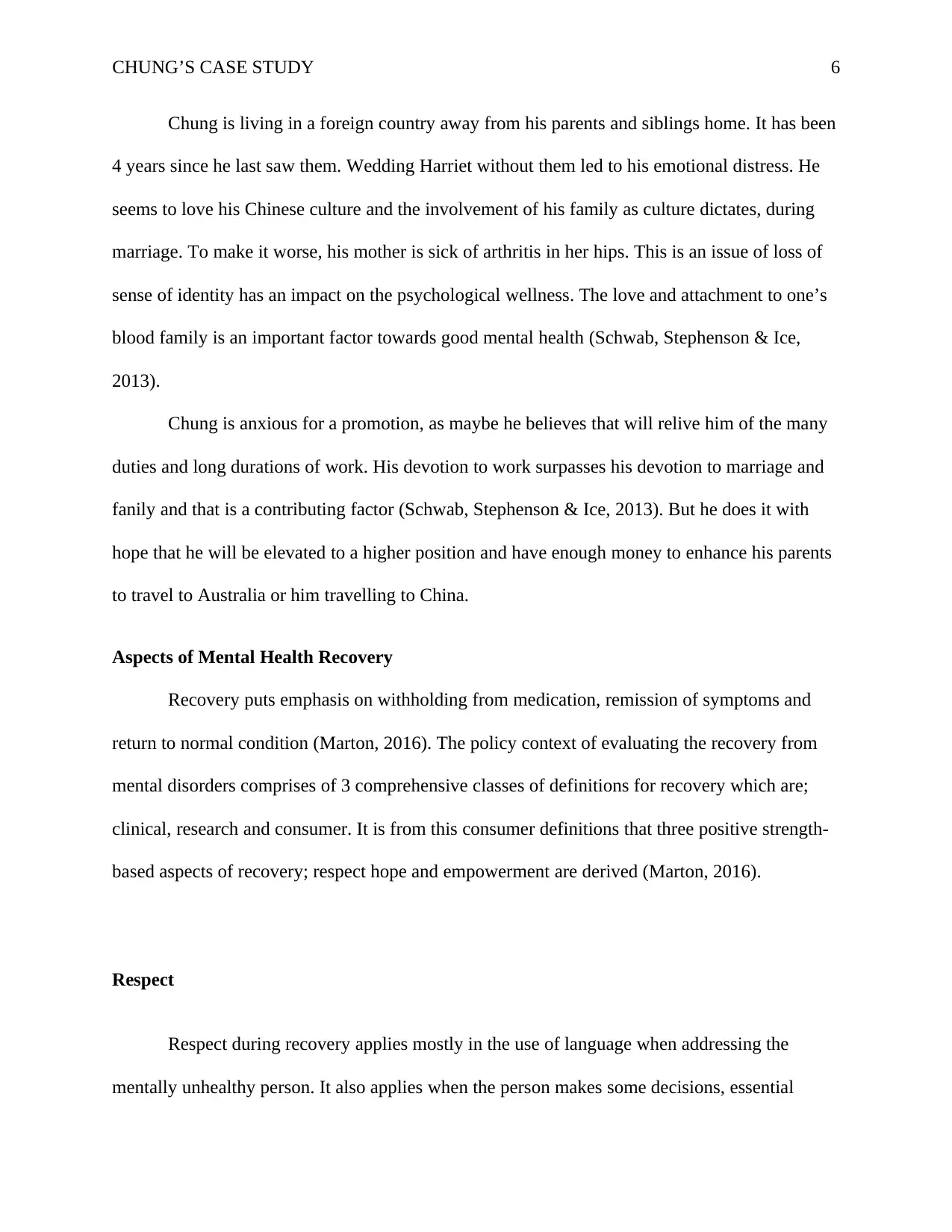
CHUNG’S CASE STUDY 6
Chung is living in a foreign country away from his parents and siblings home. It has been
4 years since he last saw them. Wedding Harriet without them led to his emotional distress. He
seems to love his Chinese culture and the involvement of his family as culture dictates, during
marriage. To make it worse, his mother is sick of arthritis in her hips. This is an issue of loss of
sense of identity has an impact on the psychological wellness. The love and attachment to one’s
blood family is an important factor towards good mental health (Schwab, Stephenson & Ice,
2013).
Chung is anxious for a promotion, as maybe he believes that will relive him of the many
duties and long durations of work. His devotion to work surpasses his devotion to marriage and
fanily and that is a contributing factor (Schwab, Stephenson & Ice, 2013). But he does it with
hope that he will be elevated to a higher position and have enough money to enhance his parents
to travel to Australia or him travelling to China.
Aspects of Mental Health Recovery
Recovery puts emphasis on withholding from medication, remission of symptoms and
return to normal condition (Marton, 2016). The policy context of evaluating the recovery from
mental disorders comprises of 3 comprehensive classes of definitions for recovery which are;
clinical, research and consumer. It is from this consumer definitions that three positive strength-
based aspects of recovery; respect hope and empowerment are derived (Marton, 2016).
Respect
Respect during recovery applies mostly in the use of language when addressing the
mentally unhealthy person. It also applies when the person makes some decisions, essential
Chung is living in a foreign country away from his parents and siblings home. It has been
4 years since he last saw them. Wedding Harriet without them led to his emotional distress. He
seems to love his Chinese culture and the involvement of his family as culture dictates, during
marriage. To make it worse, his mother is sick of arthritis in her hips. This is an issue of loss of
sense of identity has an impact on the psychological wellness. The love and attachment to one’s
blood family is an important factor towards good mental health (Schwab, Stephenson & Ice,
2013).
Chung is anxious for a promotion, as maybe he believes that will relive him of the many
duties and long durations of work. His devotion to work surpasses his devotion to marriage and
fanily and that is a contributing factor (Schwab, Stephenson & Ice, 2013). But he does it with
hope that he will be elevated to a higher position and have enough money to enhance his parents
to travel to Australia or him travelling to China.
Aspects of Mental Health Recovery
Recovery puts emphasis on withholding from medication, remission of symptoms and
return to normal condition (Marton, 2016). The policy context of evaluating the recovery from
mental disorders comprises of 3 comprehensive classes of definitions for recovery which are;
clinical, research and consumer. It is from this consumer definitions that three positive strength-
based aspects of recovery; respect hope and empowerment are derived (Marton, 2016).
Respect
Respect during recovery applies mostly in the use of language when addressing the
mentally unhealthy person. It also applies when the person makes some decisions, essential
⊘ This is a preview!⊘
Do you want full access?
Subscribe today to unlock all pages.

Trusted by 1+ million students worldwide
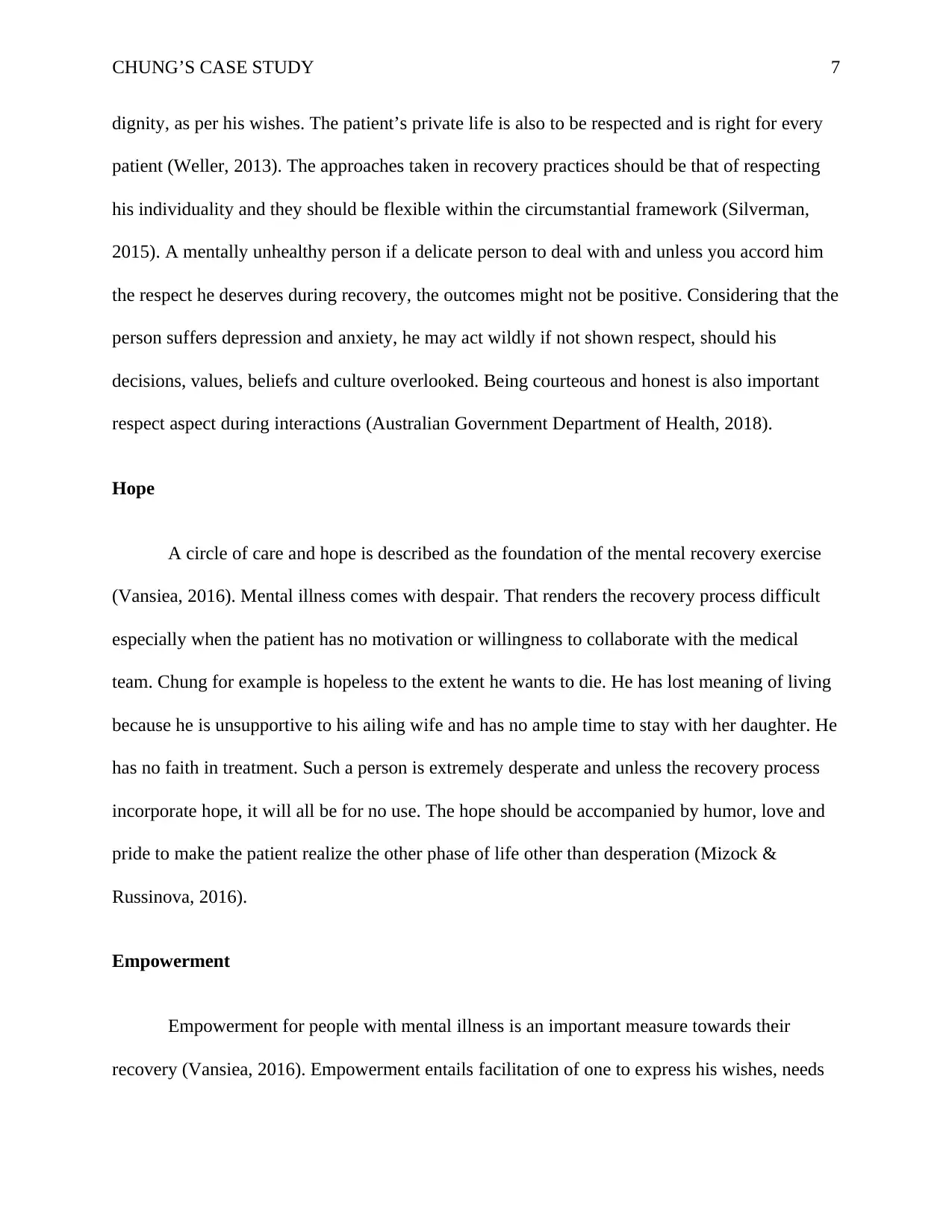
CHUNG’S CASE STUDY 7
dignity, as per his wishes. The patient’s private life is also to be respected and is right for every
patient (Weller, 2013). The approaches taken in recovery practices should be that of respecting
his individuality and they should be flexible within the circumstantial framework (Silverman,
2015). A mentally unhealthy person if a delicate person to deal with and unless you accord him
the respect he deserves during recovery, the outcomes might not be positive. Considering that the
person suffers depression and anxiety, he may act wildly if not shown respect, should his
decisions, values, beliefs and culture overlooked. Being courteous and honest is also important
respect aspect during interactions (Australian Government Department of Health, 2018).
Hope
A circle of care and hope is described as the foundation of the mental recovery exercise
(Vansiea, 2016). Mental illness comes with despair. That renders the recovery process difficult
especially when the patient has no motivation or willingness to collaborate with the medical
team. Chung for example is hopeless to the extent he wants to die. He has lost meaning of living
because he is unsupportive to his ailing wife and has no ample time to stay with her daughter. He
has no faith in treatment. Such a person is extremely desperate and unless the recovery process
incorporate hope, it will all be for no use. The hope should be accompanied by humor, love and
pride to make the patient realize the other phase of life other than desperation (Mizock &
Russinova, 2016).
Empowerment
Empowerment for people with mental illness is an important measure towards their
recovery (Vansiea, 2016). Empowerment entails facilitation of one to express his wishes, needs
dignity, as per his wishes. The patient’s private life is also to be respected and is right for every
patient (Weller, 2013). The approaches taken in recovery practices should be that of respecting
his individuality and they should be flexible within the circumstantial framework (Silverman,
2015). A mentally unhealthy person if a delicate person to deal with and unless you accord him
the respect he deserves during recovery, the outcomes might not be positive. Considering that the
person suffers depression and anxiety, he may act wildly if not shown respect, should his
decisions, values, beliefs and culture overlooked. Being courteous and honest is also important
respect aspect during interactions (Australian Government Department of Health, 2018).
Hope
A circle of care and hope is described as the foundation of the mental recovery exercise
(Vansiea, 2016). Mental illness comes with despair. That renders the recovery process difficult
especially when the patient has no motivation or willingness to collaborate with the medical
team. Chung for example is hopeless to the extent he wants to die. He has lost meaning of living
because he is unsupportive to his ailing wife and has no ample time to stay with her daughter. He
has no faith in treatment. Such a person is extremely desperate and unless the recovery process
incorporate hope, it will all be for no use. The hope should be accompanied by humor, love and
pride to make the patient realize the other phase of life other than desperation (Mizock &
Russinova, 2016).
Empowerment
Empowerment for people with mental illness is an important measure towards their
recovery (Vansiea, 2016). Empowerment entails facilitation of one to express his wishes, needs
Paraphrase This Document
Need a fresh take? Get an instant paraphrase of this document with our AI Paraphraser
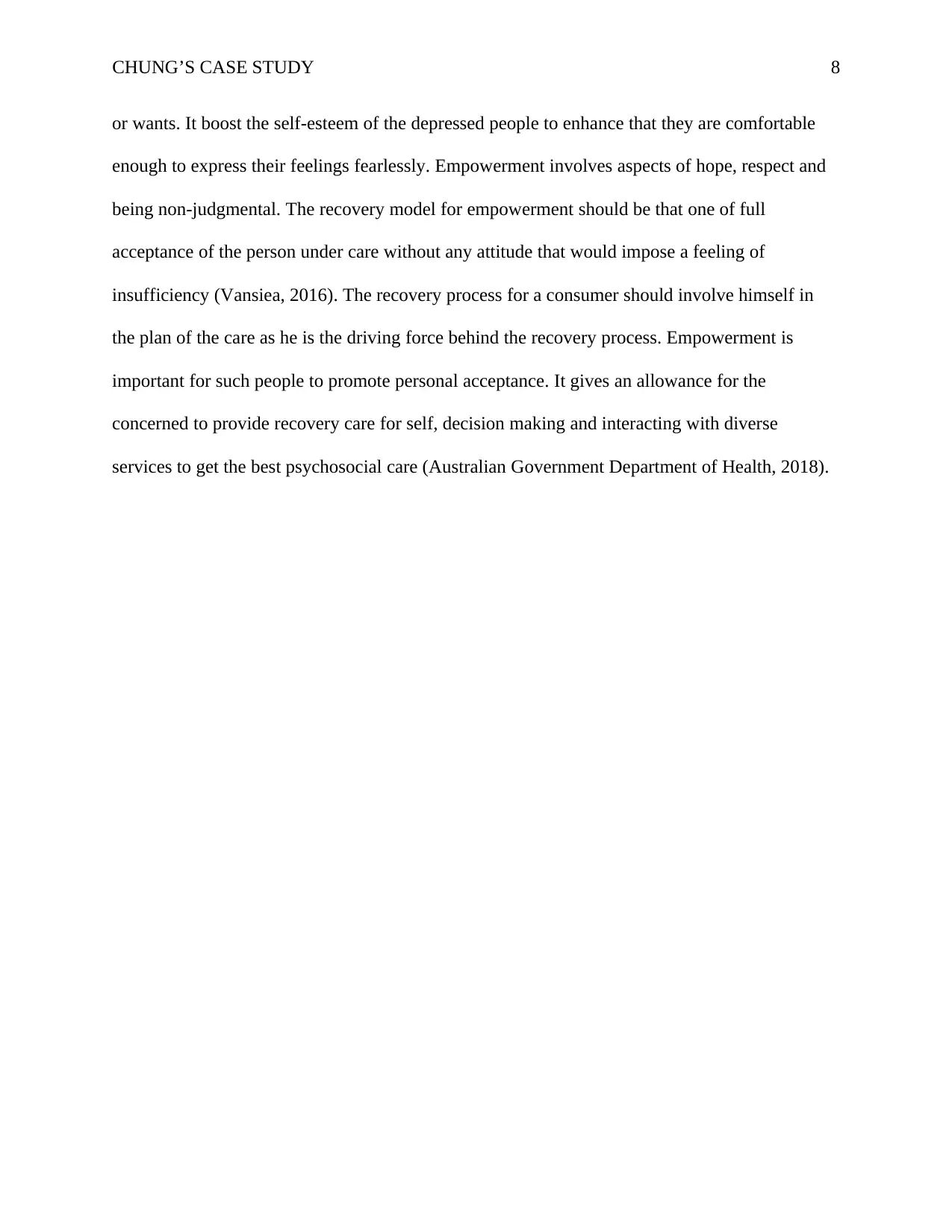
CHUNG’S CASE STUDY 8
or wants. It boost the self-esteem of the depressed people to enhance that they are comfortable
enough to express their feelings fearlessly. Empowerment involves aspects of hope, respect and
being non-judgmental. The recovery model for empowerment should be that one of full
acceptance of the person under care without any attitude that would impose a feeling of
insufficiency (Vansiea, 2016). The recovery process for a consumer should involve himself in
the plan of the care as he is the driving force behind the recovery process. Empowerment is
important for such people to promote personal acceptance. It gives an allowance for the
concerned to provide recovery care for self, decision making and interacting with diverse
services to get the best psychosocial care (Australian Government Department of Health, 2018).
or wants. It boost the self-esteem of the depressed people to enhance that they are comfortable
enough to express their feelings fearlessly. Empowerment involves aspects of hope, respect and
being non-judgmental. The recovery model for empowerment should be that one of full
acceptance of the person under care without any attitude that would impose a feeling of
insufficiency (Vansiea, 2016). The recovery process for a consumer should involve himself in
the plan of the care as he is the driving force behind the recovery process. Empowerment is
important for such people to promote personal acceptance. It gives an allowance for the
concerned to provide recovery care for self, decision making and interacting with diverse
services to get the best psychosocial care (Australian Government Department of Health, 2018).
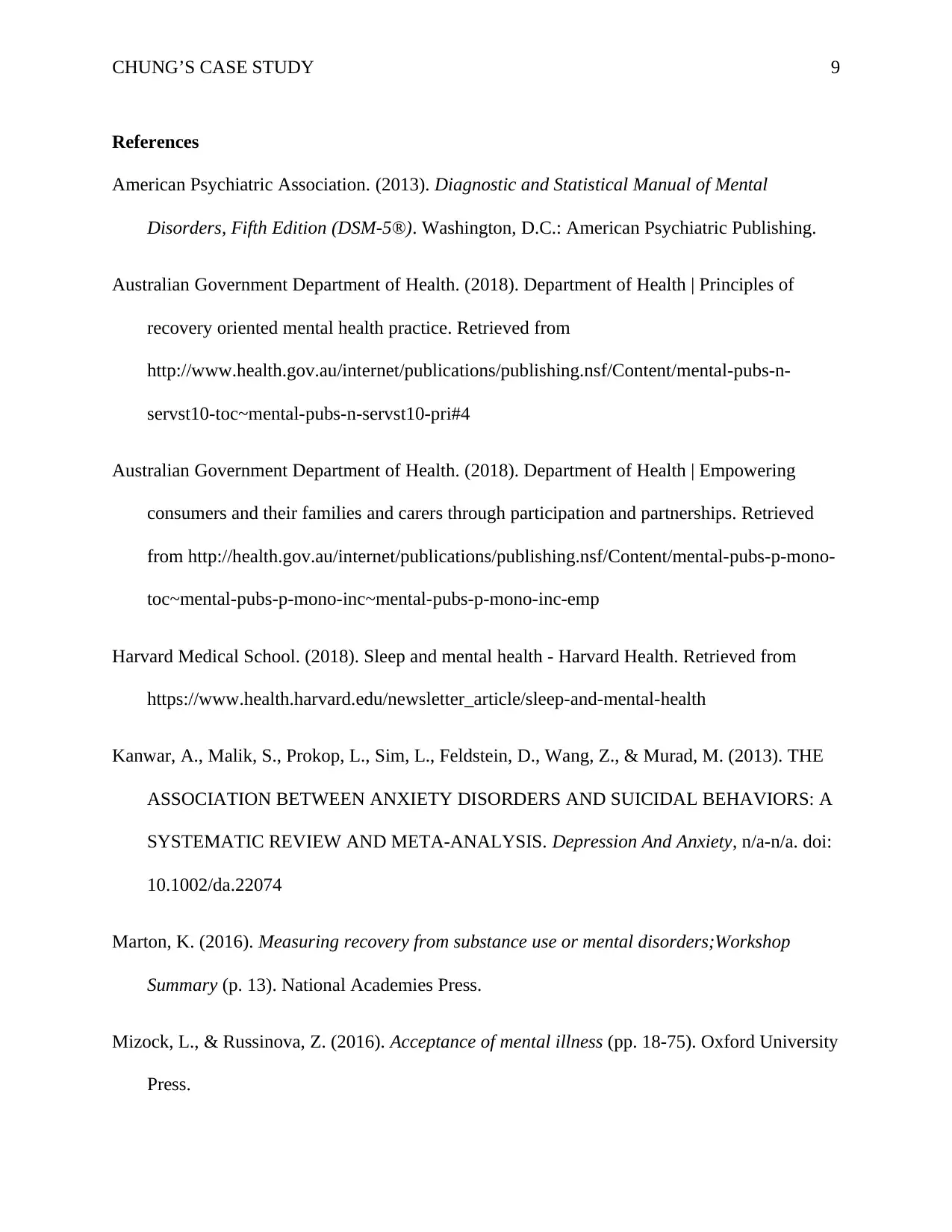
CHUNG’S CASE STUDY 9
References
American Psychiatric Association. (2013). Diagnostic and Statistical Manual of Mental
Disorders, Fifth Edition (DSM-5®). Washington, D.C.: American Psychiatric Publishing.
Australian Government Department of Health. (2018). Department of Health | Principles of
recovery oriented mental health practice. Retrieved from
http://www.health.gov.au/internet/publications/publishing.nsf/Content/mental-pubs-n-
servst10-toc~mental-pubs-n-servst10-pri#4
Australian Government Department of Health. (2018). Department of Health | Empowering
consumers and their families and carers through participation and partnerships. Retrieved
from http://health.gov.au/internet/publications/publishing.nsf/Content/mental-pubs-p-mono-
toc~mental-pubs-p-mono-inc~mental-pubs-p-mono-inc-emp
Harvard Medical School. (2018). Sleep and mental health - Harvard Health. Retrieved from
https://www.health.harvard.edu/newsletter_article/sleep-and-mental-health
Kanwar, A., Malik, S., Prokop, L., Sim, L., Feldstein, D., Wang, Z., & Murad, M. (2013). THE
ASSOCIATION BETWEEN ANXIETY DISORDERS AND SUICIDAL BEHAVIORS: A
SYSTEMATIC REVIEW AND META-ANALYSIS. Depression And Anxiety, n/a-n/a. doi:
10.1002/da.22074
Marton, K. (2016). Measuring recovery from substance use or mental disorders;Workshop
Summary (p. 13). National Academies Press.
Mizock, L., & Russinova, Z. (2016). Acceptance of mental illness (pp. 18-75). Oxford University
Press.
References
American Psychiatric Association. (2013). Diagnostic and Statistical Manual of Mental
Disorders, Fifth Edition (DSM-5®). Washington, D.C.: American Psychiatric Publishing.
Australian Government Department of Health. (2018). Department of Health | Principles of
recovery oriented mental health practice. Retrieved from
http://www.health.gov.au/internet/publications/publishing.nsf/Content/mental-pubs-n-
servst10-toc~mental-pubs-n-servst10-pri#4
Australian Government Department of Health. (2018). Department of Health | Empowering
consumers and their families and carers through participation and partnerships. Retrieved
from http://health.gov.au/internet/publications/publishing.nsf/Content/mental-pubs-p-mono-
toc~mental-pubs-p-mono-inc~mental-pubs-p-mono-inc-emp
Harvard Medical School. (2018). Sleep and mental health - Harvard Health. Retrieved from
https://www.health.harvard.edu/newsletter_article/sleep-and-mental-health
Kanwar, A., Malik, S., Prokop, L., Sim, L., Feldstein, D., Wang, Z., & Murad, M. (2013). THE
ASSOCIATION BETWEEN ANXIETY DISORDERS AND SUICIDAL BEHAVIORS: A
SYSTEMATIC REVIEW AND META-ANALYSIS. Depression And Anxiety, n/a-n/a. doi:
10.1002/da.22074
Marton, K. (2016). Measuring recovery from substance use or mental disorders;Workshop
Summary (p. 13). National Academies Press.
Mizock, L., & Russinova, Z. (2016). Acceptance of mental illness (pp. 18-75). Oxford University
Press.
⊘ This is a preview!⊘
Do you want full access?
Subscribe today to unlock all pages.

Trusted by 1+ million students worldwide
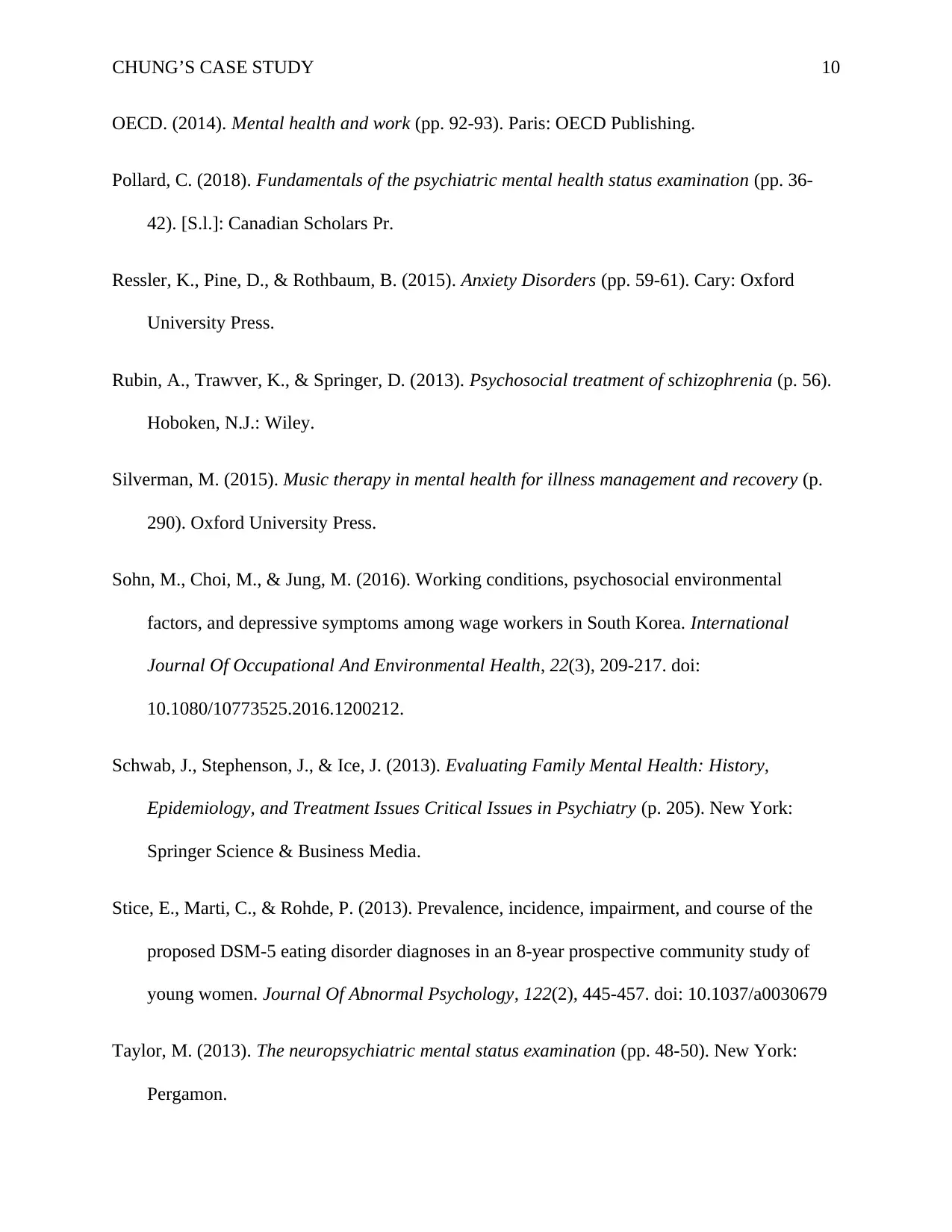
CHUNG’S CASE STUDY 10
OECD. (2014). Mental health and work (pp. 92-93). Paris: OECD Publishing.
Pollard, C. (2018). Fundamentals of the psychiatric mental health status examination (pp. 36-
42). [S.l.]: Canadian Scholars Pr.
Ressler, K., Pine, D., & Rothbaum, B. (2015). Anxiety Disorders (pp. 59-61). Cary: Oxford
University Press.
Rubin, A., Trawver, K., & Springer, D. (2013). Psychosocial treatment of schizophrenia (p. 56).
Hoboken, N.J.: Wiley.
Silverman, M. (2015). Music therapy in mental health for illness management and recovery (p.
290). Oxford University Press.
Sohn, M., Choi, M., & Jung, M. (2016). Working conditions, psychosocial environmental
factors, and depressive symptoms among wage workers in South Korea. International
Journal Of Occupational And Environmental Health, 22(3), 209-217. doi:
10.1080/10773525.2016.1200212.
Schwab, J., Stephenson, J., & Ice, J. (2013). Evaluating Family Mental Health: History,
Epidemiology, and Treatment Issues Critical Issues in Psychiatry (p. 205). New York:
Springer Science & Business Media.
Stice, E., Marti, C., & Rohde, P. (2013). Prevalence, incidence, impairment, and course of the
proposed DSM-5 eating disorder diagnoses in an 8-year prospective community study of
young women. Journal Of Abnormal Psychology, 122(2), 445-457. doi: 10.1037/a0030679
Taylor, M. (2013). The neuropsychiatric mental status examination (pp. 48-50). New York:
Pergamon.
OECD. (2014). Mental health and work (pp. 92-93). Paris: OECD Publishing.
Pollard, C. (2018). Fundamentals of the psychiatric mental health status examination (pp. 36-
42). [S.l.]: Canadian Scholars Pr.
Ressler, K., Pine, D., & Rothbaum, B. (2015). Anxiety Disorders (pp. 59-61). Cary: Oxford
University Press.
Rubin, A., Trawver, K., & Springer, D. (2013). Psychosocial treatment of schizophrenia (p. 56).
Hoboken, N.J.: Wiley.
Silverman, M. (2015). Music therapy in mental health for illness management and recovery (p.
290). Oxford University Press.
Sohn, M., Choi, M., & Jung, M. (2016). Working conditions, psychosocial environmental
factors, and depressive symptoms among wage workers in South Korea. International
Journal Of Occupational And Environmental Health, 22(3), 209-217. doi:
10.1080/10773525.2016.1200212.
Schwab, J., Stephenson, J., & Ice, J. (2013). Evaluating Family Mental Health: History,
Epidemiology, and Treatment Issues Critical Issues in Psychiatry (p. 205). New York:
Springer Science & Business Media.
Stice, E., Marti, C., & Rohde, P. (2013). Prevalence, incidence, impairment, and course of the
proposed DSM-5 eating disorder diagnoses in an 8-year prospective community study of
young women. Journal Of Abnormal Psychology, 122(2), 445-457. doi: 10.1037/a0030679
Taylor, M. (2013). The neuropsychiatric mental status examination (pp. 48-50). New York:
Pergamon.
Paraphrase This Document
Need a fresh take? Get an instant paraphrase of this document with our AI Paraphraser
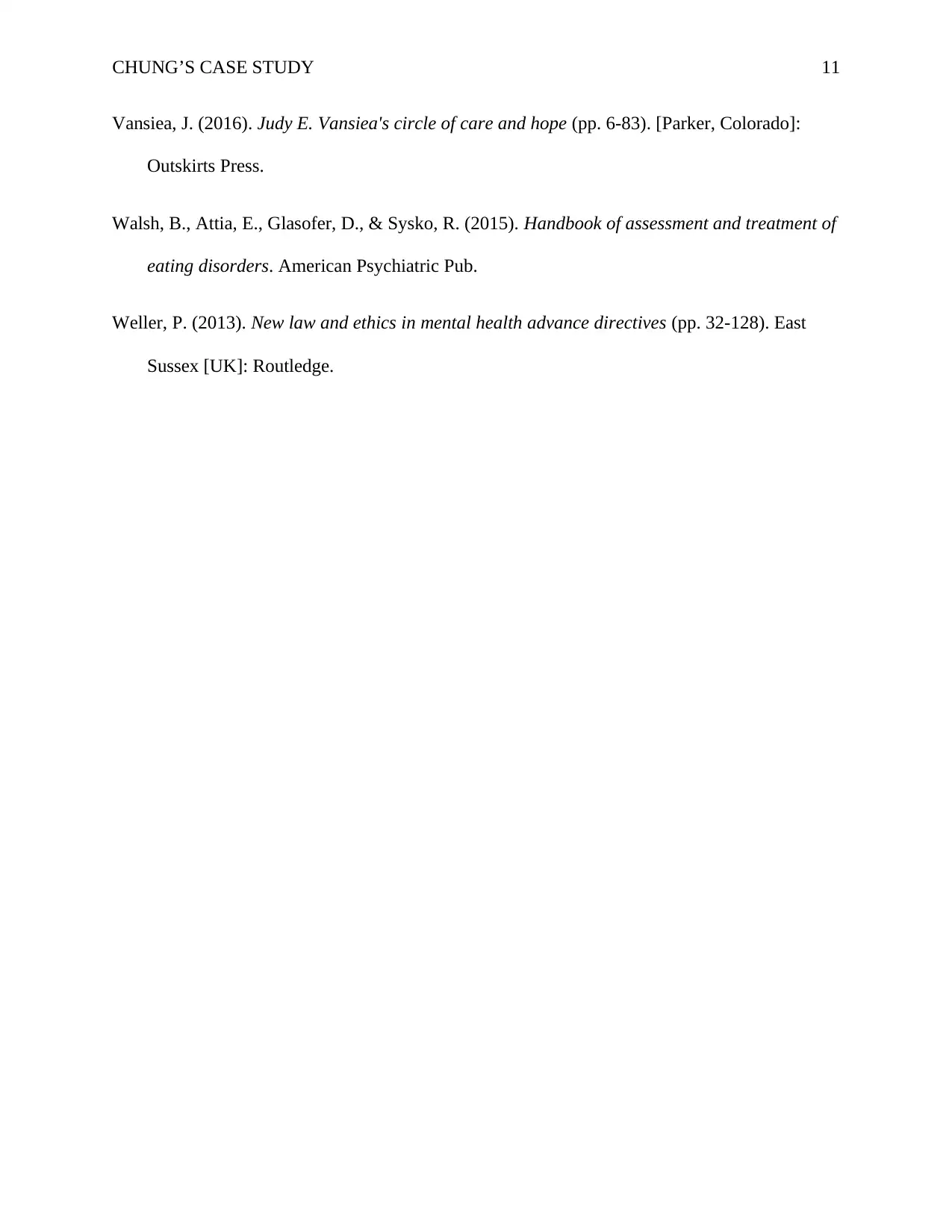
CHUNG’S CASE STUDY 11
Vansiea, J. (2016). Judy E. Vansiea's circle of care and hope (pp. 6-83). [Parker, Colorado]:
Outskirts Press.
Walsh, B., Attia, E., Glasofer, D., & Sysko, R. (2015). Handbook of assessment and treatment of
eating disorders. American Psychiatric Pub.
Weller, P. (2013). New law and ethics in mental health advance directives (pp. 32-128). East
Sussex [UK]: Routledge.
Vansiea, J. (2016). Judy E. Vansiea's circle of care and hope (pp. 6-83). [Parker, Colorado]:
Outskirts Press.
Walsh, B., Attia, E., Glasofer, D., & Sysko, R. (2015). Handbook of assessment and treatment of
eating disorders. American Psychiatric Pub.
Weller, P. (2013). New law and ethics in mental health advance directives (pp. 32-128). East
Sussex [UK]: Routledge.
1 out of 11
Related Documents
Your All-in-One AI-Powered Toolkit for Academic Success.
+13062052269
info@desklib.com
Available 24*7 on WhatsApp / Email
![[object Object]](/_next/static/media/star-bottom.7253800d.svg)
Unlock your academic potential
Copyright © 2020–2026 A2Z Services. All Rights Reserved. Developed and managed by ZUCOL.




